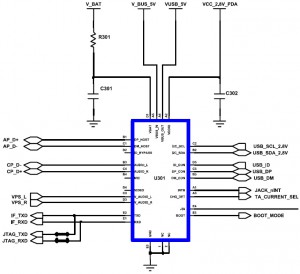Oh, I love it.
ChromeOS is Gentoo based, and as such it’s a GNU/Linux and as such in turn
it needs standard GNU/Linux kernel interfaces and as such I can use it
in combination with a full fletched Gentoo.
And because it’s a child of Google it gets support by the big bloat ware companies.
So ChromeOS forces the producers of hardware to provide usable driver code.
All posts by leviathan
ASUS Transformer Prime
I don’t believe it how bitchy this hardware has been…
Now I can show you some stuff.
First of all ( among other things because after this evening of work I just need this ego push ) I can do this 🙂
~ # whoami root
But I can also show you the CPU info:
~ # cat /proc/cpuinfo Processor : ARMv7 Processor rev 9 (v7l) processor : 0 BogoMIPS : 1993.93 processor : 1 BogoMIPS : 1993.93 processor : 2 BogoMIPS : 1993.93 processor : 3 BogoMIPS : 1993.93 Features : swp half thumb fastmult vfp edsp neon vfpv3 CPU implementer : 0x41 CPU architecture: 7 CPU variant : 0x2 CPU part : 0xc09 CPU revision : 9 Hardware : cardhu Revision : 0000 Serial : 0245000000994000
Next will be to compile for these features and do some “suit”-hunt one day…
Come on! System! Break down, then there are finally no laws anymore forbidding me to hunt suits with a shot gun >_>
Linus, I feel with you…
Apropos Asus Transformer Prime and bootloaders…
I just wanna quote Linus Torvalds because he receives my full consent… -.-
Is “I hope you all die a painful death” too strong?
- Linus to the hardware manufacturers that refuse to release the specifications of their hardware so they could operate with the Linux kernel.
- Torvalds, Linus (2007-08-22). Linus Torvalds talks future of Linux. Retrieved on 2007-08-22.
[1] http://en.wikiquote.org/wiki/Linus_Torvalds
Enough of reporters with no plan…
I have definitively enough of this “Code leaked” headers within online magazines…
If it’s an Android the kernel code is GPL, as soon as a device gets shipped they have to publish the
code because otherwise they’d break the conditions of the GPL which in turn would result in
committing a crime basically.
And as history showed us now, GPL can prevail in front of a judge.
There were indeed companies which had to pay a lot of money because they broke GPL. [1] (in German)
100’000€… they should have let them bleed more, then it would have hurt more :->
Anyway.
The usage of Android forces every producer to publish the kernel source code,
everything else is against the law
“Leaked” code in this sense does NOT exist within the FOSS world because the code builds itself up and develops during time, commit by commit.
The code slowly leaks into upstream, which is exactly the strength of FOSS, world wide cooperation…
The term leaked is just used as a marketing gag in order to attract plan less wannabes
[1] http://www.telemedicus.info/urteile/Urheberrecht/Open-Source/496-LG-Muenchen-I-Az-21-O-612304-Zur-rechtlichen-Wirksamkeit-der-GPL.html
Asus Transformer Prime: Unlock the device
Five times “We don’t suggest to do this” blah blah
This fucking new-speak for “we wanna burn you in our own crappy software with a lot of payment you’ll have to give us.
Please keep us paying for crappy software instead of just doing our job and producing just the hardware with good documentation instead.”
I’ve just told a friend of mine, basically the only good SoC producer is TI and the best engineered Laptops I received until now are the Toshiba Satellite series.
Put the engineers of TI and Toshiba into a room together with Linus Torwalds and lock them in until they have tinkered a new device together.
And the result will be something you get wet dreams of 😉
I9100G, boot loader and UART
Well then.
I’ve now tinkered together my own debugging interface for the GT-9100G:

Output on UART is the following:
Texas Instruments X-Loader 1.41 (Jan 11 2012 - 23:25:41) <-- FBL Uboot-loading from Emmc <-- SBL == U-Boot Starting OS Bootloader from EMMC ...
I’ve sent an email to Samsung, requesting the relevant patches to X-Loader in order for it to successfully initialize the I9100G-board.
If they refuse to send me the informations in which way they have modified the sources in order to run them on their board, it’s a GPL violation.
But I’m still confident that they will cooperate.
USB on Samsung Galaxy S2 (I9100G)
GNU/Linux on NotionInk Adam
Folks, I’m giving up.
This hardware is just unusable.
This tablet is only usable, when you’re using it in a cold storage house under GNU/Linux.
Because of the hardware bugs every system using multi threading only boots once, when the tablet has been lying around for some days at a cold place (like let’s say in the wine cellar)
After having been warmed up a bit, it randomly freezes somewhere in the boot process which leads to funny things like a half built up login screen…
Can’t these people read the design guide lines and data sheets before they start wildly connecting some wires and give a PCB into production?
Also this TEGRA2 chip is already a unusable piece of crap.
And people buy this crap…
Can’t we just get rid of all companies producing SoCs except Texas Instruments and can’t TI do their smart phones them self by the way?
Would make the hardware market grow rapidly in quality… >.>
Texas Instruments is obviously the only company producing usable SoCs ATM
- Good documentation
- Works as expected
- Nearly NO ASIC-errors (There are some like the battery bug in OMAP35xx)
Business processes and FOSS
Can someone please silence these managers ordering the engineers to upload a zip file instead of configuring a git repo? And why the hell don’t they just include the .git folder? And why are there people reimporting tar files into git?
At the end it’s just pissing me off and it’s kinda assholish upon the engineers whose commit logs you’ve just deleted…
At least now the new Samsung Galaxy S2 (GT-I9100G) has an OMAP4 inside.
The only usable SoC on the market.
Yes! The only!
Android…
Samsung Galaxy S2 and Asus Transformer Prime, both with Android market…
I don’t pay for software, I’m FOSS user…
WTF? Money for installing packages?
My solution for such an issue is easy.
If it costs, don’t use it 🙂
